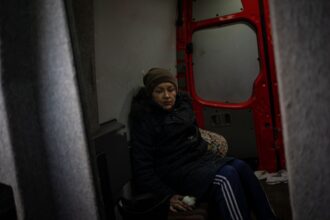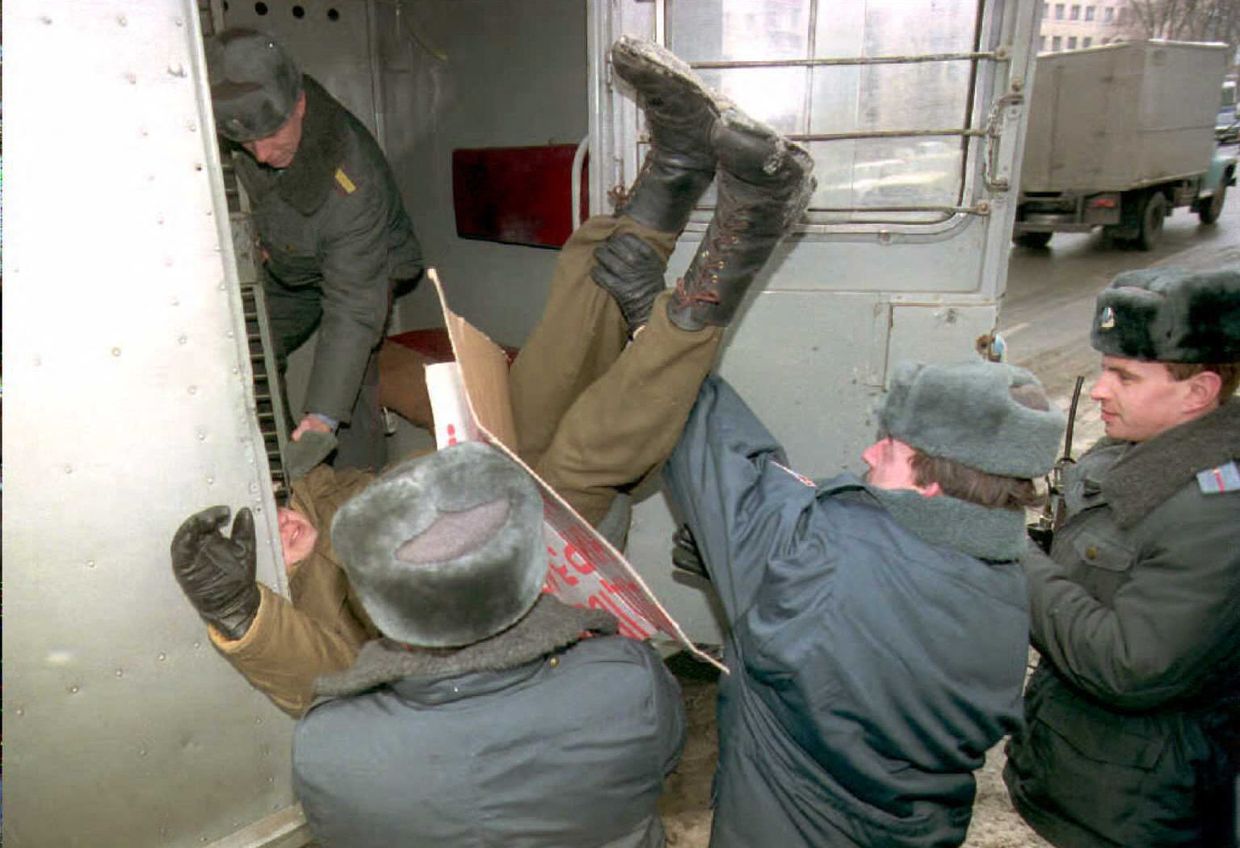(L-R), U.S. president Bill Clinton, Russian president Boris Yeltsin and Ukrainian President Leonid Kravchuk shaking their hands after signing the historic Trilateral Agreement on January 14, 1994 in Moscow. (Diana Walker/Getty Images)
When the Ukrainian Soviet Socialist Republic adopted its Declaration of Sovereignty to gain greater freedoms and rights within the Soviet Union in July 1990, getting rid of the country’s nuclear weapons was a top priority.
The 1986 accident at the Chornobyl Nuclear Power Plant had caused Ukraine to suffer greatly. Ukraine’s pro independence political elites also understood that Ukraine could never be independent as long as it had nuclear weapons controlled by Moscow on its territory.
Volodymyr Vasilinko, a member of civil-political group Rukh, and one of the drafters of Ukraine’s Declaration of Sovereignty said at the time, “By being a nuclear nation, (Ukraine), could not achieve full independence.”
In less than a year, Ukraine became the third largest nuclear arsenal in the world, which included more than 5,000 tactical and strategic weapons.
The question no longer was whether to become a neutral and nonnuclear state in order for the Soviet forces, which included nuclear forces, to be removed from the territory of Soviet Ukraine. The question was no longer whether or not Ukraine, as an independent state, should give up its nuclear arsenals, but at what cost.
In 1991, Ukraine began diplomatic relations with the West, and Russia, which led to the signing of the Treaty on the Non-Proliferation of Nuclear Weapons and the Budapest Memorandum. The Budapest Memorandum extended security assurances for Ukraine in exchange for moving warheads towards Russia.
Since Russia invaded Ukraine, flagrantly violating this memorandum in 2014, many have wondered whether Ukraine made a grave mistake by giving up its nuclear arsenal and if the Western world was wrong to insist that Ukraine do so.
There is no consensus on whether or not Ukraine’s nuclear disarmament mistake. Some have argued that Ukraine could have received more than just thin security guarantees from the West. Others have hailed Ukraine’s nuclear disarmament a victory for nuclear non-proliferation.
What factors led Ukraine’s nuclear weapons to be abandoned?
The decision to give up the nuclear arsenal was made for several reasons: the need for financial aid from the West, the legitimacy of being a new nation on the international stage, the fear of retaliation by Russia, the technical difficulties of managing and controlling nuclear weapons on their territory, as well as security assurances.
Various estimates indicate that by 1993, the inflation rate in Ukraine had risen to over 10,000% and that production had fallen as much as 50 percent since 1990. Ukraine’s budget deficit was 20% of GDP and its balance-of-payments gap was over $3 billion.
The United States did not want to see decades of work with the Soviet Union to stop the spread of nuclear arms go to waste. The U.S. offered financial assistance to Ukraine in exchange for Ukraine giving up its nuclear arsenal. By 1994, Ukraine was the third-largest recipient of U.S. aid.
The Ukrainian state also sought recognition from the international community as a newly-formed independent country. Ukraine’s status on the world stage was raised when it took seriously the issue of nuclear nonproliferation and denuclearization. Refusing to comply with the international order on nuclear nonproliferation would have isolated Ukraine at a time when it was most needed.
Then there was the issue of Russia. It was not thrilled about the idea of an independent Ukrainian nation. Moscow held a large number of controls over the nuclear weapons in Ukraine. Refusing to surrender the weapons could have led to a confrontation between Russia and all parties involved.
The prospect of security assurances from the U.S.A., the U.K. and Russia via the Budapest Memorandum was what gave Ukraine the final push to sign the NPT, and to agree to transfer its nuclear weapons to Russia.
Many people believed, and continue to believe, that the security guarantees in this memorandum are worth nothing more than the paper on which they were printed. Others have argued the fact that three superpowers agreed to offer Ukraine security guarantees gave it much-needed credence when some questioned its new statehood.
What did Ukraine receive in exchange for its nuclear weapons?
Ukraine received three types of assurances (in varying degrees) in exchange for its nukes: compensation and removal, and security guarantees.
The Ukrainian government asked for compensation for the value that it received from Russia for the highly-enriched Uranium in the nuclear weapons that could be used as fuel for nuclear reactors.
Ukraine also requested financial assistance to eliminate its intercontinental missiles, ICBMs silos, and Bombers, which Ukraine could not afford at the time due to the economic situation. The U.S. agreed that they would provide the funding to remove them.
In exchange for the surrender of its nuclear weapons, Ukraine asked for security guarantees or assurances. The Budapest Memorandum, signed in 1994, committed the U.S.A., U.K. and Russia to refrain from using force against the territorial integrity of Ukraine or its political independence.
The signatories “reaffirmed” their commitment to “respecting the independence and sovereignty of Ukraine, and the existing border lines. With the agreement, they vowed that if there was any aggression, the signatories will seek immediate action from the United Nations Security Council to assist Ukraine.
Kyiv hoped for legally binding guarantees, which would have prompted the U.S. Senate to ratify a formal treaty instead of the assurances in the final memo. Officials from the U.S. at that time said that Washington wasn’t willing to offer Ukraine such guarantees.
Was it a mistake to give up nuclear weapons?
Some people have questioned whether Ukraine made a grave mistake by giving up its nuclear arsenals after independence. It is hard to imagine that Russia would invade Ukraine if Ukraine had nuclear weapons.
Not to mention that some of the weapons Russia is using to invade Ukraine are likely to be those that Ukraine gave to Russia as part of the Budapest Memorandum in the 1990s.
Some have questioned the value of the Budapest Memorandum in light of the Russian invasion. Volodymyr Zelensky, the president of Ukraine, has questioned this agreement and said that the assurances contained in it haven’t held up.
Yuri Kostenko is one of those who, in his memoir, argues that Ukraine could have gotten more in exchange for their nuclear weapons. According to Kostenko, Russia and the U.S. who knew little about Ukraine’s history and culture, eventually reached an agreement that suited their interests.
Documents published over the years and some in the last six months show that the administration of then-U.S. president Bill Clinton was not concerned about Ukraine’s real security concerns regarding its Russian neighbor, who had already made territorial claims when Ukraine gained independence.
Clinton himself said in April 2023 that he regretted convincing Ukraine to give up their nuclear arsenal.
Others have hailed Ukraine’s signing of the NPT, along with Belarus, and Kazakhstan, inheritors also of Soviet nuclear arsenals and committing themselves to be non-nuclear as a win for nuclear nonproliferation.
Read More @ kyivindependent.com




